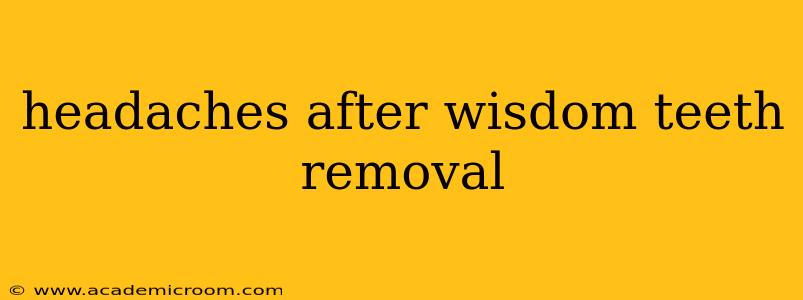Wisdom teeth removal is a common procedure, but it often comes with post-operative discomfort, including headaches. Understanding the causes, effective treatments, and preventative measures can significantly improve your recovery experience. This comprehensive guide will address common concerns and provide valuable insights into managing post-wisdom teeth removal headaches.
Why Do I Have a Headache After Wisdom Teeth Removal?
Headaches after wisdom teeth extraction are quite common. Several factors contribute to this post-operative pain:
- Inflammation and Swelling: The surgical site naturally swells after the procedure. This swelling can put pressure on surrounding nerves and tissues, leading to headaches, often felt around the temples or behind the eyes.
- Medication Side Effects: Pain medication, such as ibuprofen or narcotics, can sometimes cause headaches as a side effect. This is particularly true if you're sensitive to certain medications.
- Sinus Involvement: If your wisdom teeth are located close to your sinuses, the extraction process can irritate the sinus cavities, resulting in sinus pressure and headaches.
- Dry Socket: Although less common, a dry socket (alveolar osteitis) can lead to intense pain, including throbbing headaches. This occurs when the blood clot protecting the extraction site dislodges, exposing the bone.
- Jaw Muscle Tension: The procedure itself, and the subsequent recovery period, might cause you to tense your jaw muscles, leading to tension headaches.
What Kind of Headache Do I Have?
Knowing the type of headache can help determine the most effective treatment. Post-wisdom tooth extraction headaches can manifest as:
- Tension Headaches: These are usually mild to moderate, causing a tight band-like sensation around the head.
- Sinus Headaches: These are often accompanied by facial pressure, nasal congestion, and possibly a fever.
- Migraines: While less frequent, some individuals might experience migraines triggered by the surgery or medication. These are characterized by severe throbbing pain, often on one side of the head, accompanied by nausea and sensitivity to light and sound.
How Long Will the Headache Last After Wisdom Teeth Removal?
The duration of headaches varies from person to person. Most headaches associated with wisdom teeth removal subside within a few days, typically 3-5 days. However, more persistent pain might indicate a complication, such as a dry socket, requiring immediate attention from your dentist or oral surgeon.
How Can I Treat a Headache After Wisdom Teeth Removal?
Managing post-operative headaches involves a combination of strategies:
- Follow Your Dentist's Instructions: Adhering to the post-operative care instructions given by your dentist or oral surgeon is crucial. This includes taking prescribed pain medication as directed and avoiding strenuous activities.
- Ice Packs: Applying ice packs to your jaw and cheeks can help reduce swelling and alleviate pain. Apply ice for 15-20 minutes at a time, several times a day.
- Over-the-Counter Pain Relievers: Over-the-counter medications like ibuprofen or acetaminophen can help manage mild to moderate pain. Always follow the dosage instructions carefully. Avoid aspirin, as it can increase bleeding.
- Rest: Adequate rest is essential for healing and reducing pain. Get plenty of sleep and avoid strenuous physical activity.
- Elevation: Elevating your head while sleeping can help reduce swelling.
How Can I Prevent Headaches After Wisdom Teeth Removal?
While some degree of discomfort is expected, you can take steps to minimize the risk of headaches:
- Follow Pre-Operative Instructions: Your dentist or oral surgeon will provide specific instructions before the surgery. Following these instructions carefully can help reduce complications and pain.
- Manage Stress: Stress can exacerbate pain. Practice relaxation techniques like deep breathing or meditation to help manage stress levels.
- Stay Hydrated: Drinking plenty of fluids helps prevent dehydration, which can worsen headaches.
- Avoid Alcohol and Smoking: Both alcohol and smoking can interfere with the healing process and increase the risk of complications.
When Should I Call My Dentist or Oral Surgeon?
Contact your dentist or oral surgeon immediately if you experience:
- Severe, unrelenting pain: Pain that doesn't respond to over-the-counter medication.
- High fever: A temperature of 101°F (38.3°C) or higher.
- Excessive bleeding: Bleeding that persists or soaks through several gauze pads.
- Signs of infection: Increased swelling, redness, pus, or foul odor from the extraction site.
By understanding the causes, treatments, and preventative measures for headaches after wisdom teeth removal, you can navigate your recovery more comfortably and efficiently. Remember, always consult your dentist or oral surgeon if you have any concerns about your post-operative recovery.
